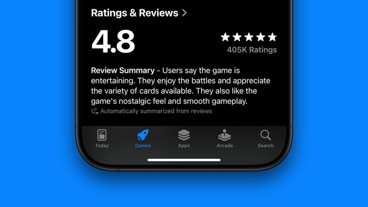The developer of BlueMail is asking other developers of iOS and macOS apps to call out Apple's "Sherlocking" practice, when it incorporates features from other apps and services, in the belief it's unfair for Apple to take another's ideas "without permission, payment, or credit."
Blix, the firm behind BlueMail and Followapp, is currently in the process of suing Apple over the introduction of "Sign in with Apple," under a claim it copies BlueMail's "Share Email" feature. The BlueMail function allowed users to communicate using a "manageable public interaction address, without revealing their private interaction address," a concept that Sign in with Apple performs by creating custom email addresses and forwarding communications onward.
After filing that lawsuit in October, the firm has moved on to try and garner support from other developers who underwent similar instances of "Sherlocking," where their apps became effectively worthless after Apple produced its own version of core functions.
Speaking to the Financial Times, Blix is still working on the lawsuit, but believes the slow legal process is working in Apple's favor. While the firm has been in contact with other developers who underwent similar treatment and are unhappy with the circumstances, many have so far elected to avoid suing Apple or making too much of a fuss in public due to the potential for retribution.
"We are considering all options, including a class-action lawsuit," Blix co-founder Ben Volach claims. "We are going to make sure this is resolved. We are sure there are thousands that are suffering from this."
We're issuing a call for unity against the biggest tech company. If Apple has kicked you out of its App Store, used guidelines to control you, hijacked your ranking or stolen your tech, reach out to us at fair@bluemail.me https://t.co/W6Coxa5v1Z#fairness2020 #apple #developer
— BlueMail (@BlueMail) February 4, 2020
The accusations of unfairness stem from Apple being both a rival software producer to the developers and the controller over the digital storefronts where the apps are sold. This has led to further claims Apple is making it so that the original apps are not able to compete against the Apple-produced equivalents fairly.
In Blix's case, its app was removed from the macOS App Store due to security concerns, but Apple insists "We have attempted on multiple occasions to assist in getting their BlueMail app back on the Mac App Store."
Apple also fields suggestion that it manipulates the app store to its benefit, but it asserts it does no such thing. "We provide all developers with a fair and level playing field on which they can compete," Apple told the report.
For parental control app Kidslox, the introduction of Apple's Screen Time coincided with the app being kicked off the app store along with other similar tools, under claims there were user privacy and security risks. In Kidslox's case, it was unable to provide updates to the app for over a year, though that changed once it was challenged in an "Abuse of Dominant Position" complaint at the European Commission in early 2019.
 Malcolm Owen
Malcolm Owen







-m.jpg)






 Marko Zivkovic
Marko Zivkovic
 Christine McKee
Christine McKee
 Andrew Orr
Andrew Orr
 Andrew O'Hara
Andrew O'Hara
 William Gallagher
William Gallagher

 Mike Wuerthele
Mike Wuerthele
 Bon Adamson
Bon Adamson




-m.jpg)



22 Comments
I have also seen it on Windows 10 and Android. I have wondered how legal that behaviour is. Since Linux is free is there no legal action?
Blix is suing Apple because of a feature of “Sign in with ”; the generation of anonymous email addresses. Apparently Blix’s app BlueMail offers this same feature and therefor, they have been ‘sherlocked” by Apple.
Blix did not invent anonymous email address generation and forwarding. In fact, there are many other apps and services that offer this same feature. Creating an anonymous email address to hide your main address is not a new idea. You can also create anonymous domain names, alternative passwords, random credit card tokens, phone numbers etc. The point of all of these is to be able to shutdown communication and/or access should the need arise, without needing to change your original.
The problem is that it doesn’t stand up to basic scrutiny and glosses over the fact that Apple’s software, layouts and design aesthetic (beyond recommended guidelines) are constantly copied - even their icons are copied and reused without permission. Apple practices restraint because the alternative is to spend too much time in court.
Now let’s look at it from a high level: Apple produced software costs Apple money, 3rd party software on the App Store earns Apple 15-30% without Apple doing “anything”, hence it’s to Apple’s advantage just to sit and let 3rd party developers do their thing.